Puget Systems Serenity SPCR Edition: Blissful Silence
by Dustin Sklavos on February 10, 2011 12:00 AM EST- Posted in
- Systems
- Intel
- Radeon
- Sandy Bridge
- Puget Systems
- Serenity SPCR
Gaming Performance
It's not going to surprise anyone to see the Puget Serenity take last place in all of these tests; the second-slowest gaming system we've reviewed sports a Radeon with more than twice the number of stream processors, more than twice the memory bandwidth, and higher clocks to boot. That said, many of the really high scores we've seen are largely academic: can anyone really tell the difference between 100 frames per second and 150? Without getting into the ridiculous argument of whether or not the human eye can see more than 30 frames per second (if it's not supposed to be able to, I'm pretty sure most of the video geeks in the readership—myself included—are superhumans), that framerate should still be your baseline for acceptable performance.
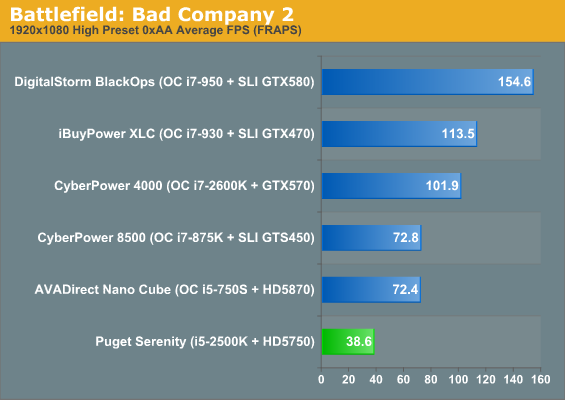
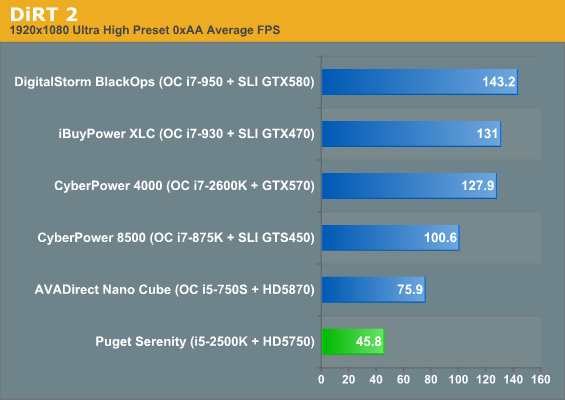
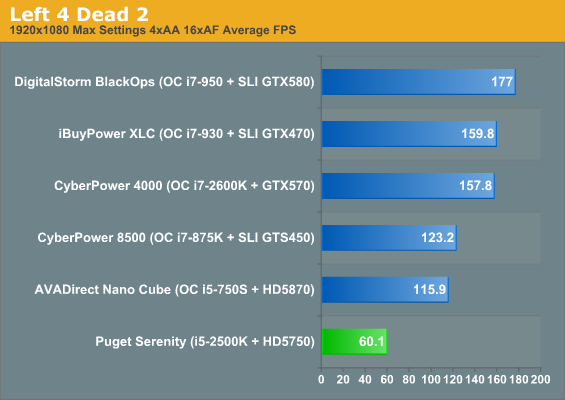
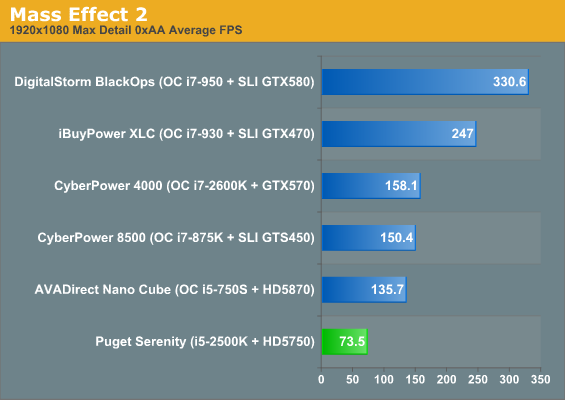
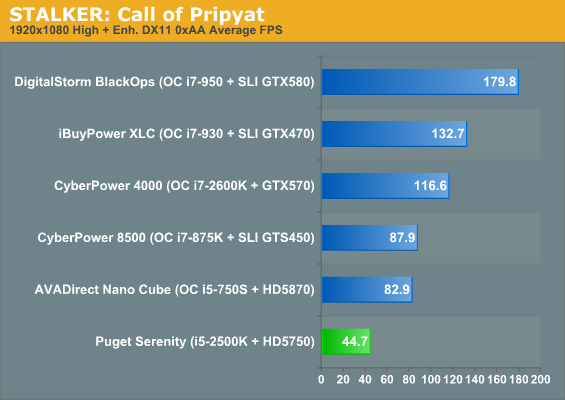
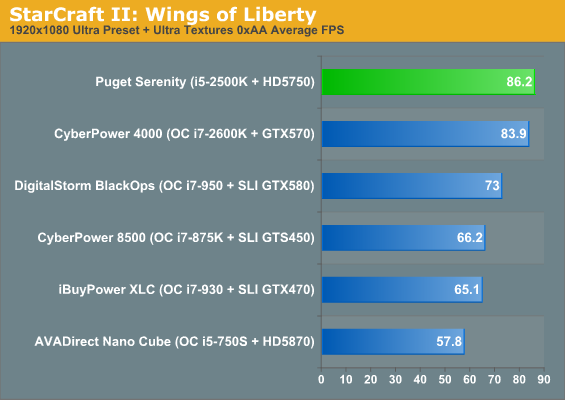
Outside of the stunningly CPU-limited StarCraft II, Puget Systems's Serenity is able to at least beat the 30fps mark by a fairly healthy margin. I like to see framerates in at least the forties to ensure smooth gameplay, but any of these games are perfectly playable at our "High" preset, which is basically running them at maximum or near-maximum (as in the case of Call of Pripyat) settings, 1080p, and no anti-aliasing (excepting Left 4 Dead 2). Knowing that we're a little bit close to our ceiling, let's see what happens when we do kick anti-aliasing in with our "Ultra" preset.
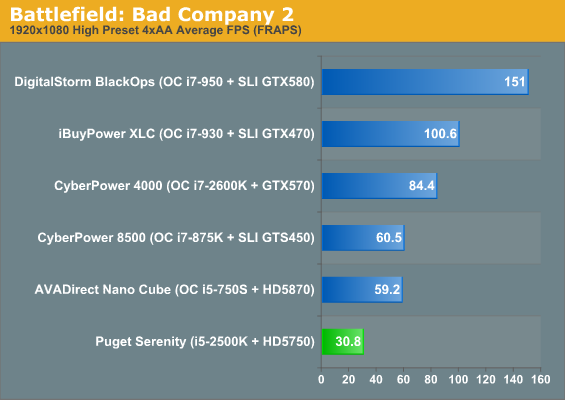
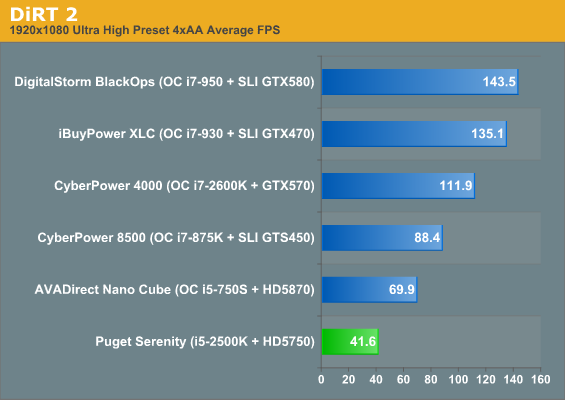
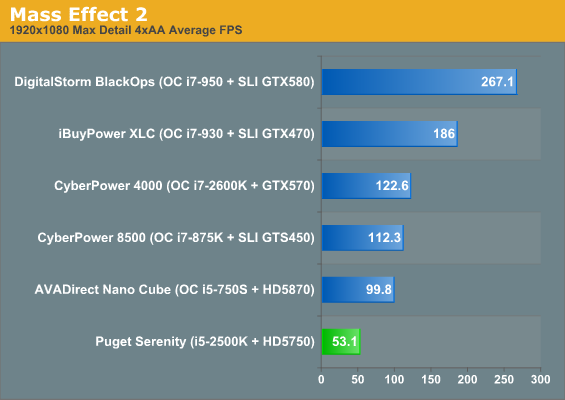
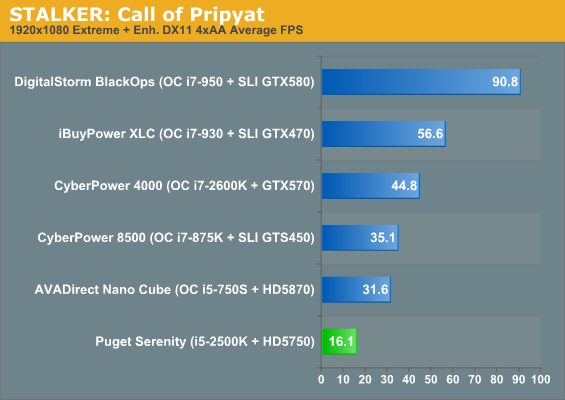
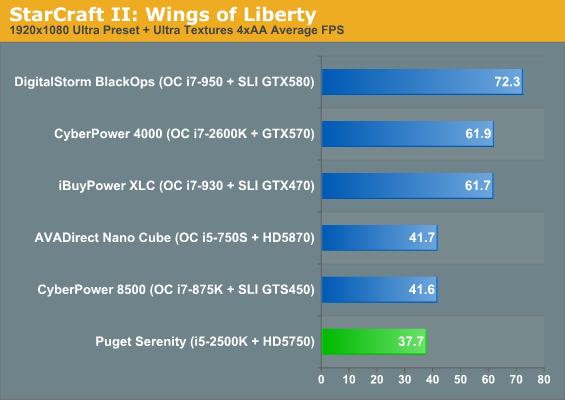
Battlefield: Bad Company 2 is pushing its luck and Call of Pripyat is fairly punishing even on our other systems, but for the most part these games (outside of Call of Pripyat) remain playable and fluid. Shifting the bottleneck back to the video card in StarCraft II sends the Serenity tumbling back to the bottom of the heap, but even then it's still very playable. Gamers looking for extra frames may want to disable anti-aliasing in that title anyhow, as the image quality difference is negligible when the performance impact is taken into account. Suffice it to say these settings are basically the threshold for the Radeon HD 5750, and while performance is good, the 6850 is going to be a welcome upgrade.










139 Comments
View All Comments
PartEleven - Thursday, February 10, 2011 - link
Oh I'm not assuming. I know.You suggested using an Asus 6870 DirectCu. At stock settings. SilentPCReview measured the sound of the Asus EAH6850 DirectCU @ 15db idle. That's 50% louder than this system. Try again.
erple2 - Thursday, February 10, 2011 - link
Why spend 1+Million dollars on a Bugatti Veyron when you can buy an inexpensive Hyundai to drive from point A to B? They Hyundai will even carry more people than the Bugatti. It'll also get substantially better Gas Mileage. In stop and go traffic, you won't be able to tell that the Bugatti can go zero to ludicrous speeds faster than the Hyundai can get to 60. Does that mean that the Bugatti is be sold? Clearly, you're not the target market.You're comparing apples to oranges. In just about every instance in the world, optimizing for one specific vector (in this case, actually silent operation) tends to drive the cost up exponentially beyond a certain point. You as the consumer have to decide whether that cost is worthwhile. Do $50,000 speakers sound better than a $5000 speaker? To someone willing to spend that much, it might (protip - generally only highly trained ears can tell the difference). Does that mean that I'm the target market for a 50k speaker? No. I don't have a highly tuned and trained ear (though I'd be willing to bet that many people that buy the 50k speaker also don't have trained ears, but that's another discussion).
Ultimately, your computer will be faster. But it will also be louder. And may not be as well assembled (though that depends on your skill level). Plus, if you have any problems with your computer, you get to call the 12 different manufacturers of each of the components to get it fixed.
strikeback03 - Friday, February 11, 2011 - link
Another parallel is that if you are going to drive the Veyron legally and only on public roads, the only thing it does better than the Hyundai is draw attention. None of its strengths are evident in that usage model. This computer system seems similar - outside of some specific circumstances (music recording, theater use) the average user doesn't have a quiet enough workspace that the difference between an 11dB system and a 20dB system matters. So the biggest benefit would be the ability to brag in forums about your 11dB system.It would be interesting to see if purchasing these same components (minus the custom foam and such) off the shelf and assembling would produce a system that is still inaudible in the majority of homes.
nikclev - Thursday, February 10, 2011 - link
While I don't dispute that the corsair AX 850 is a great PSU, I disagree that it is much better than the CP-850. They are both great PSU's, the antec has slightly less ripple and the corsair has slightly better regulation according to johnny guru. With only performance in mind, they are both excellent PSU's.The antec is only usable in certain antec cases, but is around $120 retail. The Corsair is around $200 retail. With value in mind, the antec is a much better psu than the corsair IF you have an antec case to put it in.
PartEleven - Thursday, February 10, 2011 - link
What the title says. I've noticed more than a few comments on this article from people interested in a tech site that reviews parts for their quietness to help them build a silent gaming machine. That's pretty much exactly what SPCR does. Go check them out!And if you've already checked them out and wrote them off as ridiculous or useless, I'd like to know why? Why are all of their reviews invalid? Why are they so terrible? Why, if they provide the kind of analysis some people want so much, are they still ignored so much?
Just curious.
KayDat - Friday, February 11, 2011 - link
I suspect most people don't really understand the difference between 'quiet' and 'silent'. Most people grew up and live around noisy PC's, where anything that isn't a blow dryer is reasonably quiet. Perhaps many don't understand the implications of quiet computing? Of course, technically the Puget SPCR build isn't really 'silent' either, but for practical intents and purposes, it is.Of course, quiet computing is a slippery slope; once you start, there's a good chance you won't be satisfied until you reach silent, as each time you lower the noise floor, you become accustomed to the noise, and feel like going for more (that is, less noise ;)
BTW, nice seeing other SPCRers kicking around on the net, PartEleven =]
Dug - Thursday, February 10, 2011 - link
What I don't think most of you understand is that a majority of people have no interest in building or setting up a computer. What these guys do is an art and they have the experience to do it correctly.If you walk down the street I'll bet there may be 1 in a 1000 people that actually build there own.
So the price they have is not bad for the experience, attention to detail, and support.
Sure parts can be bought separately for less, but this can be said about anything.
You can put together a car for less than buying one made by a manufacturer, but how many of you go and do that?
How many of you have had to take calls from family members or friends. You may think its no big deal, but if you made something for them, you are responsible. And believe me, tech support is no fun and its not cheap. Not to mention running web site, ordering products, marketing, etc. This is a small business for higher end clients.
To go from 11dBA at idle to 12 dBA at full load is no easy feat. Most of you building your own don't care about that subtle difference, but I know a lot of people that do.
I think they've done an outstanding job and should be commended for bringing this type of machine to market.
bigbob123456 - Thursday, February 10, 2011 - link
Give me 6 hours and I'll put this same system together and only charge you $180 in labor, since that's what I currently make in 6 hours. It's one thing to put a car together from scratch, but a sound proofed computer needs little more than a screwdriver, some adhesive, and time. Therefore your analogy is terrible.Furthermore the other costs you mention, website, parts, marketing, tech support, etc are largely capitalized long term expenses and distributed over the sale of money systems. No matter how you spin it, this system is overpriced and not built as well as it could be (quality + part selection)
KayDat - Thursday, February 10, 2011 - link
I really think people here don't understand the true meaning of 11dB. It is for all intents and purposes, silent. The average bedroom at night sits at around 30dB. 11dB is FAR below the sound floor of most situations.Is this system something that everyone needs? Probably not. But some do, and it is desirable to others.
You make it sound like Puget sit on their hands and charge people for them to do it; silent computing isn't as simple as screwdriver, adhesive and time. Your argument that "this system is...not built as well as it could be" also falls short; the AT review affirms many times that this is a solid machine, and that Puget did a top notch job. Their parts selection aren't aimed at 12yo ricers or the average gamer, but those looking for a silent computer.
Would I buy this computer? Probably not. Neither would the majority of the AT readership. Sure, I could buy all the identical parts, and put together a system that might be fairly quiet, but it probably won't reach 11dB, EVEN WITH IDENTICAL PARTS. There are batch differences in all computer parts, from fans to motherboards and graphics cards, resulting in different sound profiles and electrical noise. Puget spend time hand picking their parts, ensuring you get a quietest parts. If you're interested in silent/quiet computing, I suggest you come visit SPCR and spend some time reading some of their articles and posts in the forums.
Dug - Friday, February 11, 2011 - link
You forgot a lot of things.You have to research the parts and test to make sure you can claim that 11dba
You have to use your own money to order the parts.
Unpack everything and put it together.
Hope that the parts you ordered work- oh wait one doesn't so you have to spend the time for rma.
Now install Windows and all updates- install things like flash, adobe reader, etc.
Test- test- test. Because you don't want to find out 2 hours later the ram isn't good, certain fan isn't at spec, etc
Supply set up instructions.
Now package everything up and set up shipping.
Hope that you aren't scammed from a bad visa.
And last, are you going to provide 1yr support for that $180 when the person doesn't know how to plug in the mouse?
Now you have to pay for rent, electricity, water, payroll, taxes, advertising, etc.
Good luck on only chargin $180 profit. You won't make it long.